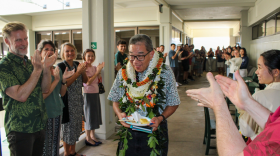Minda Yamaga’s mom was born at Heart Mountain Relocation Center in Wyoming.
Growing up in Hawaiʻi, Yamaga knew the history of the thousands of Japanese in the islands and on the continent who were forcibly incarcerated during World War II. But she said she didn’t understand the struggles that her family faced.
That changed a few years ago when her family traveled to Heart Mountain.
"The pilgrimage to Heart Mountain was truly life changing for all of us," she said. "The stories that were told were like those that I’ve never heard.”
Yamaga is president of the Japanese American Citizens League’s Honolulu chapter. And it’s stories like her family’s that community leaders hope to preserve and honor.
The JACL is one of many groups that receive funds through a national grant program. The Japanese American Confinement Sites program was set up in 2006 — providing $38 million to preserve these historic sites and their history.
More funding was needed, so federal lawmakers approved another $80 million. U.S. Sen. Brian Schatz was a co-author of the measure.
More than 2,000 Japanese from Hawaiʻi were incarcerated during World War II. They were predominantly community, business and religious leaders suspected of disloyalty. But none were found guilty of sabotage, espionage or other acts against the United States.
"We’ve been fortunate to get a good amount of funding. And it’s been very helpful for us to do the research and fund a lot of research," said Nate Gyotoku, president and executive director of the Japanese Cultural Center of Hawaiʻi. "And it definitely benefits the National Park Service because a lot of the research that we’re able to do on Honoʻuliʻuli will eventually be used at the park.”
He said the nonprofit has received about $500,000 from the grant program for several projects.
That includes documentaries, oral histories and other educational programs. They’re also working on a project that will create a database of Honoʻuliʻuli documents from the National Archives.
“It forces us to realize that these injustices can happen everywhere, including in Hawaiʻi," he said. "And we have to be vigilant. So it's very important for us to continue educating students about the story.”
Yamaga said the grant program also funded several JACL projects, including a documentary premiering in April.
She said she hopes they and other organizations will be able to take on more projects as meaningful as what she experienced at Heart Mountain.
“That kind of tangible, first-person experience is what really helped my children and even those younger really be transported, really feel what had happened," she said. "Seeing how important it was, I was more committed to learning about my family and also trying to learn to make a difference.”






